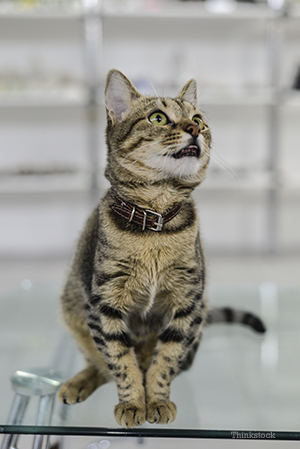
Ah, the old saying, “Cats rule, dogs drool.” We cat lovers know that our four-legged friends are fastidious groomers – in other words, they like to stay clean. So cats rarely drool the way that our canine companions do.
What does it mean when cats drool?
If you notice your cat drooling, this is highly abnormal and warrants a veterinary visit. Drooling is often due to underlying medical problems in cats such as:
Dental disease causing your cat to drool
Feline resorptive lesions (often called feline odontoclastic resorptive lesion or FORL) are a common cause of dental disease in cats, and result in significant oral pain and drooling. FORL, also called cervical line erosions, cavities, neck lesions, and external or internal root resorptions, can occur at the level where the gum line meets the tooth. Often times, FORL can be seen as a red line along the gum in your cat’s mouth. However, if your cat has a lot of tartar (hardened plaque) over the tooth, it may hide the gum lesion. FORL is extremely painful and can result in mouth sensitivity, fractures of the teeth, inappetance, a foul smell from the mouth, and drooling. Untreated, it can cause chronic pain in your cat and even weight loss.
Kidney failure causing your cat to drool
One of the #1 killers of cats is kidney failure, and it can be seen in either acute or chronic conditions. Chronic renal failure (CRF [also known as chronic kidney injury, CKI]) can result in clinical signs of weight loss, increased thirst, increased urination (noted by larger clumps of urine in the litter box), dilute urine, halitosis (i.e., bad breath), and drooling. The kidney normally filters BUN and creatinine (two waste products of the body) out. When these levels build up in the blood stream, they result in uremic ulcers in the mouth, esophagus and stomach. With CRF, the sooner you notice clinical signs, the sooner your veterinarian can treat it and the longer cats can survive! Your veterinarian may treat with:
- IV fluids
- Blood work monitoring
- Medication
- A low protein diet
- Stomach protectants
Corrosive poisons causing your cat to drool
Because cats have altered liver metabolism (called glucuronidation) when compared to dogs, they are not able to metabolize drugs or chemicals as well. Certain household products like laundry detergent, liquid potpourri, and other cleaners can be irritants in dogs (causing general signs like vomiting and diarrhea), but can be corrosive in cats. This can result in burns in the mouth, on the tongue, and in the esophagus and stomach. Accidental poisoning can result in severe drooling. If you think your cat got into something corrosive, try to gently and carefully flush out the mouth with water and offer something tasty (like chicken broth, canned tuna water, milk, etc.) to flush out the esophagus and dilute the poison from the mouth. When in doubt, contact your veterinarian, emergency veterinarian or ASPCA Animal Poison Control immediately and seek immediate veterinary attention.
Poisonous plants causing your cat to drool
Certain poisonous plants contain insoluble calcium oxalate crystals and can cause intense burning of the mouth when accidentally ingested by cats. Plants such as:
- Calla lily
- Peace lily
- Diffenbachia
- Elephant ear plant
- Umbrella plant
- Mother-in-law’s tongue
Thankfully, insoluble calcium oxalate plants are minimally poisonous to cats, but they can result in severe drooling. If you think your cat got into one of these plants, try to gently and carefully flush out the mouth with water and offer something tasty (like chicken broken, canned tuna water, milk, etc.) to flush out the mouth. Typically, veterinary attention isn’t necessary with these types of insoluble calcium oxalate plants unless profuse vomiting and inappetance is noted. That said, make sure it wasn’t a more dangerous or deadly plant like an Easter lily! Click here to learn about the very dangerous Easter lily poisoning.
Trauma causing your cat to drool
There are important safety reasons that cat’s should stay inside. Keeping your cat indoors will help minimize any risk of trauma (e.g., being hit by a car, attacked by a dog, etc.). As an emergency critical care specialist, I often see cats develop severe jaw fractures after undergoing trauma, and a luxated tempomandibular joint or jaw fracture can result in severe drooling (due to the inability to close the mouth). When in doubt, seek immediate veterinary attention for a thorough oral exam and possible x-rays.
Foreign bodies causing your cat to drool
Rarely, cats can accidentally swallow thread with a needle still attached. Unusual foreign bodies can get caught in the tongue, soft or hard palate or back of the throat, resulting in oral pain, drooling, and inability to close the mouth. Again, a veterinary exam, sedated oral exam and x-rays may be necessary!
Cancer causing your cat to drool
Cats — especially those that are white with lack of pigmentation — may be more at risk for developing a malignant, aggressive cancer called squamous cell carcinoma (SCC). While this can develop anywhere, SCC often develops in the eye, mouth and ears. Clinical signs of cancer — especially in the mouth — can include:
- Drooling
- Halitosis
- Not eating
- Dropping food from the mouth
- Weight loss
- Inability to close the mouth
When in doubt, check with your veterinarian for an examination to make sure there isn’t an underlying cause for drooling cats. While normal for many dogs, our elegant, clean cats don’t like to drool!
If you have any questions or concerns, you should always visit or call your veterinarian -- they are your best resource to ensure the health and well-being of your pets.



